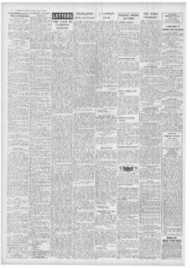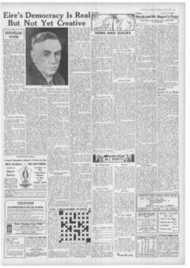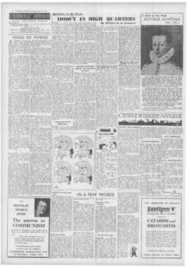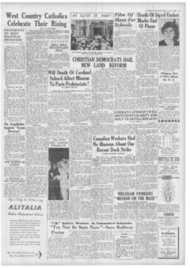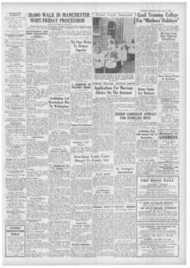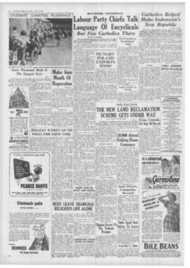Page 4, 17th June 1949
Page 4

Report an error
Noticed an error on this page?If you've noticed an error in this article please click here to report it.
Tags
Share
Related articles
Why Was H. G. Wells Allowed To Represent Britain In U.s.a.?
The Truce That Passed Northern Ireland By
The Reality Of Easter
Building A Bridge To Non-christian World
British Offer To U.s.s.r.
PRIDE OF POWER
AS Christians, we are indined to take short cuts when it comes to assessing the dangers of Communism. Communist-is as the avowed enemy of religion and Communism as the open threat to our ingrained bourgois respectabilities, these are the main pivots on which our indignation about Communism rests.
But it is important that we should try to see deeper—or, more accurately, that we should actively realise far more deeply than we habitually do what is involved in the first of those pivots, namely Communism's avowed hostility to religion. To this end we may well derive great help from perceptive writers who do not start from the religious end, and consequently have to analyse out for themselves the spiritually and morally disintegrating logic of a totalitarianism which is founded on the pride of power.
One such logical analysis, in the form of fiction, is now available, and it is well worth reading and
studying. The fact that it is written by a radical socialist makes it all the more interesting. We refer to George Orwell's Nineteen Eighty-Four (Seeker and Warburg, 10s.).
Most alarmingly, the scene is set in 1984—when our infant children will be in their thirties and our young men in their fifties and sixties. By that date, so Orwell imagines, Britain will be " Airstrip One" in the State of Oceania, which, with the States of Eurasia Eastasia, will then comprise the globe. These three totalitarian States are perpetually at war, and the book describes the philosophy and life of Oceania through the story of Winston Smith, a member of the Outer Party in the records department of the Ministry of Truth.
Winston is a rebel against the Party, and, having fallen in love with Julia, a member of the Junior Anti-Sex League, they are decoyed by a member of the Thought Police at the Ministry of Love into revealing their mood of rebellion. From then on it is the lob of the Ministry of Love to cajole, argue and torture Winston into that victory over himself which meant that at last he really loved " Big Brother " whose " black moustachio'd face gazed down from every commanding corner " in Oceania.
The story itself, with its unnecessarily frank love interest, and the ingenious details of the totalitarian machinery are somewhat naive and childish, but Orwell's working-out of the philosophical and moral mainsprings of the system is brilliant and very well worth pondering.
• * is
AT first sight, it seems that the author has set the picture far too early in history. But on reflection it will be seen that the date of this particular development is plausible.
Thirty-five years is not too short a time for the international reorganisation which could succeed a triumph of Communism while it is made clear in the book that at that date life as we know it would in a good many respects continue. Thus it is the Party which has evolved in to a closed privileged class embodying and carrying into effect the philosophy of power. The masses remain the "proles," living in entire abstraction from religion and culture, very much the kind of rationed, ersatz, politically-led life of today. We realise how little is needed to effect the necessary changes at that level We can further our sense of the plausibility of the setting by reminding ourselves that in some dozen countries in the world this actual stage has already been virtually reached.
Nor is the development of the Party more implausible when we follow Orwell's development of principles already at work in the world of today.
Thus the Communist treatment of language—in other words treatment of our vehicle of Truth—as nothing but an instrument of propaganda, as for example in their use of, the word " democracy "
leads logically enough to the
Ministry of Truth. This Ministry introduces a new language devised to make it impossible to find words which can express a here tical thought. The Ministry of Truth has monopolised the word " truth " for whatever suits the party purposes, just as the Ministry of Love monopolises the word " love " for the " love " of Big Brother which is hatred of everyone and everything else. The word "doublethink " covers the process of really believing a lie.
Orwell has to rely on mechanical devices to effect one of the most necessary, yet absolutely critical, changes. This is the process of literally eliminating the past by obliterating all records of the past and constantly re editing the contemporary record to make it harmonise with the latest news or edict. Because of this there. is no effective memory of history, and the Party, however often it contradicts itself, is always right.
Whether such an achievement would be a practical possibility may well be doubted, but even the idea reminds us of the extent to which the full status of the human race depends on the perishable record of history and bow far the perversion of man could be carried by the destruction or control of that record which is our link with Truth as known and experienced in the time dimension.
MOST imporant of all, however,
is the analysis of the underlying motive which keeps the wheels going in this monstrosity of a triumphant totalitarian world.
The motive is, of course, the lust of power.
Here Orwell (though he makes no mention of the fact) comes full circle in history to the fall of the Angels and the fall of man. Pleasure and even riches, when they subservc pleasure rather than power, are dangers to the soul of man, but limited dangers. They turn in on the individual and they
I lead to satiety. Not so the greatest sin of pride in power which is outward-looking and I insatiable. Its one limitation is ' the mortality of the person in whom the appetite resides. But Satan's immortality can be aped by the Party which so long as it can retain power can retain life.
" We know that no one ever seizes power with the intention of relinquishing it. Power is not a means, it is an end. One does not establish a dictatorship in order to safeguard a revolution; one makes the revolution in order to establish
the dictatorship. The object of persecution is persecution. The object of torture is torture. The object of power is power." And again: " Slavery is freedom. Alone—free—the human being is always defeated. It must be so, because every human being is doomed to die which is the greatest of all failures, But if he can make complete, utter submission, if he can escape from his identity, if he can merge himself in the Party so that he is the Party, then he is all-powerful and immortal."
Without mentioning the Devil, Orwell has written the most actual diabolical book of our times. And certainly one of the Devil's most intelligent lieutenants has his present address in Moscow, but there are others around and about US. 4
blog comments powered by Disqus



